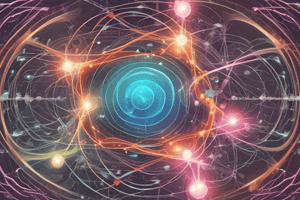Podcast
Questions and Answers
What did E. Goldstein discover in 1886?
What did E. Goldstein discover in 1886?
- The indivisibility of the atom
- The identification of electrons
- The existence of sub-atomic particles
- The presence of canal rays in a gas discharge (correct)
What is the charge of a proton represented as?
What is the charge of a proton represented as?
- Minus one (-1)
- Plus one (+1) (correct)
- It varies
- Zero (0)
What is the mass of an electron considered to be?
What is the mass of an electron considered to be?
- Unknown
- Equal to that of a proton
- Negligible (correct)
- Heavier than a proton
Where were the protons believed to be located within the atom?
Where were the protons believed to be located within the atom?
What did Rutherford conclude from the α-particle scattering experiment?
What did Rutherford conclude from the α-particle scattering experiment?
What did Rutherford calculate about the radius of the nucleus based on his experiment?
What did Rutherford calculate about the radius of the nucleus based on his experiment?
What is a drawback of Rutherford’s model of the atom?
What is a drawback of Rutherford’s model of the atom?
What feature did Rutherford's nuclear model propose?
What feature did Rutherford's nuclear model propose?
What is the mass number defined as?
What is the mass number defined as?
How is the atomic number denoted?
How is the atomic number denoted?
If the number of protons in an atom is 6, what is its atomic number?
If the number of protons in an atom is 6, what is its atomic number?
What determines the atomic number of an atom?
What determines the atomic number of an atom?
Flashcards are hidden until you start studying




